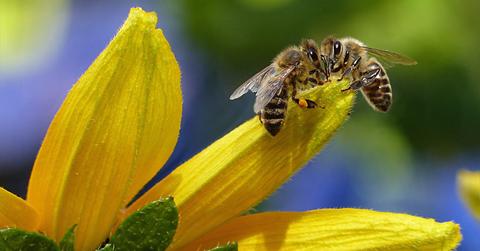Sir David Attenborough Is Telling People How To Help Bees In Their Backyards
If you see a bee who looks confused or disoriented, it may not be sick. It just needs a little help from a friend.
Updated May 31 2019, 11:32 a.m. ET
Documentary filmmaker and naturalist Sir David Attenborough is an incredibly influential person when it comes to both conservation and environmentalism.
It's said he influenced the Queen of England's decision to ban single-use plastic from her estate.
Like the rest of the world, she was reportedly horrified by the evidence presented in Attenborough's BBC documentary Blue Planet 2 in 2017, which showed the destruction being wreaked upon marine life by plastic waste.
In particular, the story of a pilot whale who lost her calf to toxic exposure from plastic chemicals made many aware of what their casual plastic use was doing to other living creatures.
Now, Sir Attenborough is asking for people to consider another species on the edge of collapse: the honeybee.
On his Facebook page, Attenborough urged followers to look out for pollinators making their way from flower to flower. Not all bees that seems disoriented, or found wandering on the ground, are near death. They might just need some help.
"In the last 5 years the bee population has dropped by 1/3," he wrote. "If bees were to disappear from the face of the earth, humans would have just 4 years left to live. This time of year bees can often look like they are dying or dead, however, they're far from it.
"Bees can become tired and they simply don't have enough energy to return to the hive which can often result in being swept away. If you find a tired bee in your home, a simple solution of sugar and water will help revive an exhausted bee.
"Simply mix two tablespoons of white, granulated sugar with one tablespoon of water, and place on a spoon for the bee to reach. You can also help by sharing this post to raise awareness."
A small drop of advice for bee-lovers, or for anyone who is concerned about population die-off for hives. According to the Sierra Club, there's no one specific reason why bees are dying; rather, it's a combination of "parasites, pathogens, pesticides, poor nutrition, and habitat loss."
Some countries have banned or limited the use of harmful pesticides associated with colony collapse disorder, but there are still more things average citizen can do.
Beyond a spoonful of energy boosting potion, there are a number of ways to help bees. Growing flowers that attract them is helpful, especially in urban environments where they might have to travel considerable distance to find food.
Amateur beekeepers have even been opening up hives in strategic places in cities, as a way to support hives and educate the general population about the importance of bees to our food system.
You may not be ready to manage an entire bee hive, but consider sparing a spoonful of sugar for your friendly neighborhood bee.
